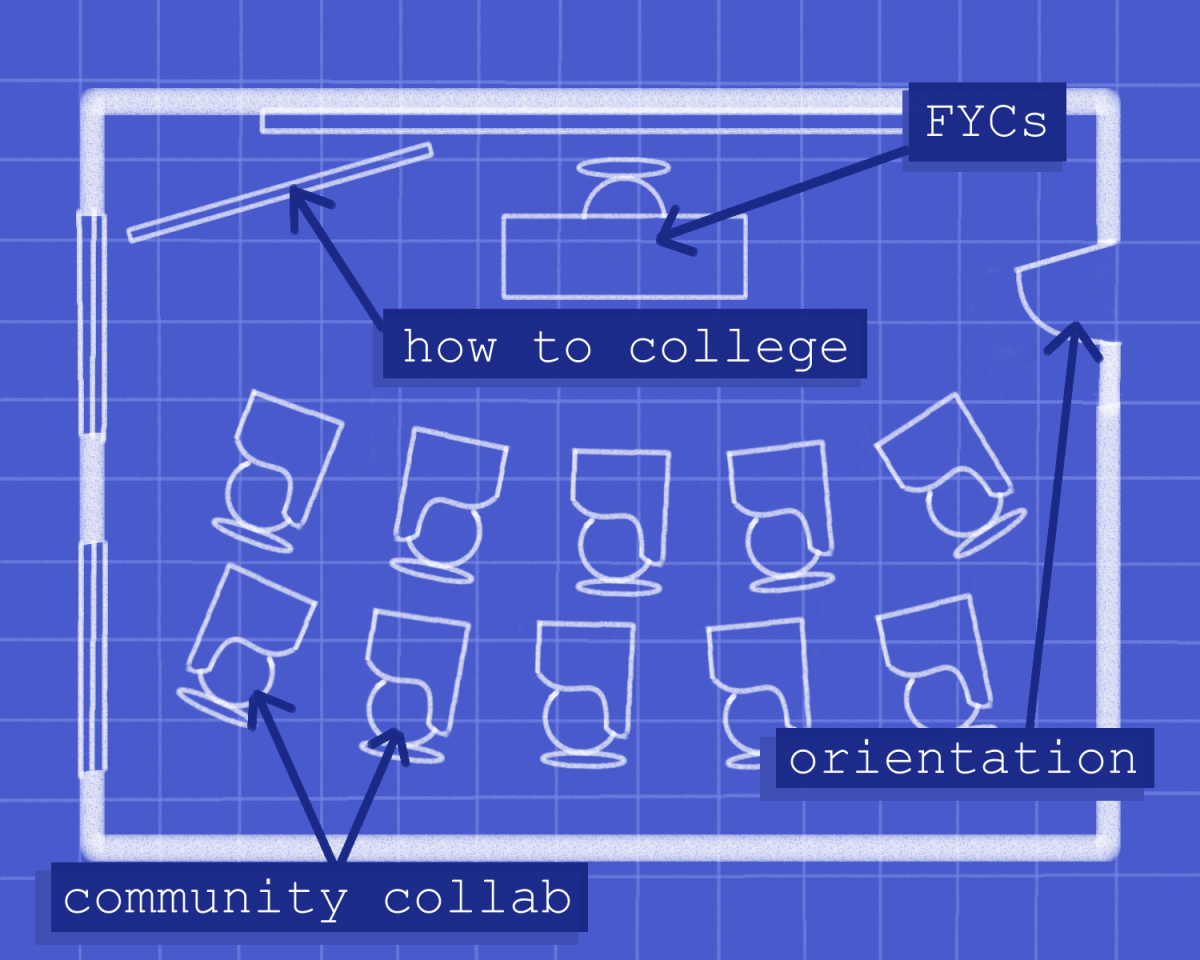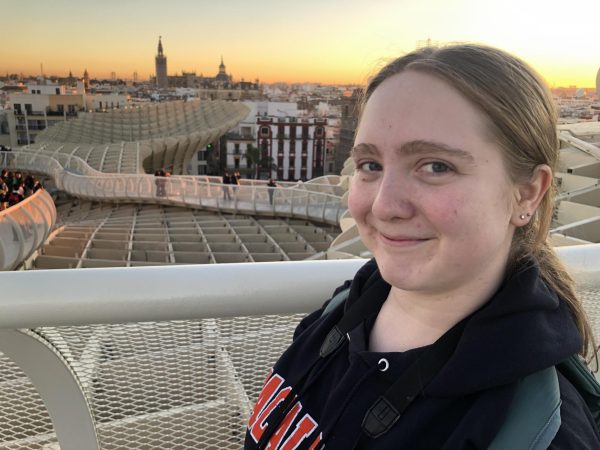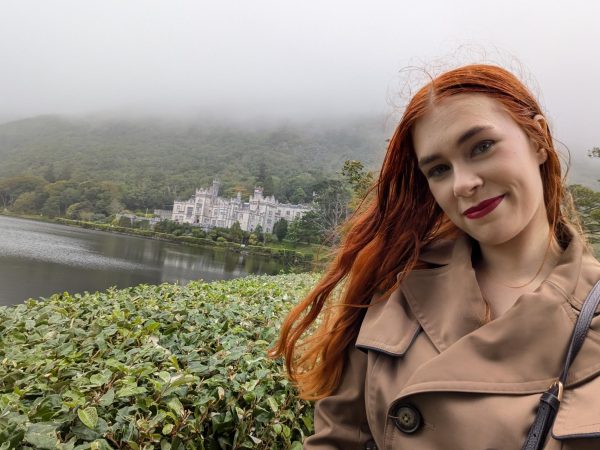Much as the end of summer might signal a closing of a door, it also opens another for many students each year: the beginning of their time in college. At Macalester, there has been a great deal of work behind the scenes to make this First-Year Experience (FYE) a memorable and transformative experience. It starts with orientation but goes far beyond.
The developments being made on the FYE started in 2022 with the inauguration of Macalester’s Strategic Plan. Work began on revamping the curriculum and thinking about what the academic experience could look like beyond its current form. A focus on the FYE soon grew out of this academic focus.
“Everybody takes a first-year course (FYC), and everybody does a capstone,” Associate Dean of Advising and Professor of Environmental Studies Louisa Bradtmiller said. “The capstones are wildly different from one another. First-year courses are more similar to one another than the capstones are. But there’s really not a whole lot in between […] there’s not like a sort of holistic thing that goes throughout the first year.”
Acknowledging this lack of consistency, particularly for first-year students, Bradtmiller teamed up with Executive Director of the Center for Student Leadership and Engagement Laurie Adamson* to develop and expand the FYE program as Strategic Plan work began in earnest. So far, most of their work has been in the planning stages, as any permanent curriculum shifts would need approval by both the Educational Policy and Governance Committee and a faculty vote.
In the meantime, however, they’ve already seen progress with shifting orientation to a week-based schedule, allowing for more breaks and downtime for new students who might feel overwhelmed with the sudden changes college can bring. Additionally, there was a trio of FYCs in the fall of 2024 that had professors and staff members from different areas of campus teaming up to teach experimental courses on a range of topics, from vampires to digital literacy.
“We had several courses [fall 2024] that were experimental liberal arts first-year courses,” Bradtmiller said. “Then these were experimental liberal arts non-first-year courses [offered this semester], So [the non-FYCs] came out of that program that has its own pool of money. And the idea, as its name implies, is to introduce students to the liberal arts in different ways.”
As part of these FYE efforts, two new two-credit courses were offered during the spring 2025 semester: MCST 192: “Strengths in Action,” taught by Marcos Cruz and Jinna Johnson, Associate Directors of Career Exploration, and INTD 111: “Thriving at Macalester College,” taught by Professor of the Classical Mediterranean and Middle East Beth Severy-Hoven.
While these two courses were created to help enrich the first-year experience, they each had independent goals. Johnson and Cruz wanted to focus on preparing students for future work experiences.
“We were hoping that the course would be able to act as sort of a bridge experience,” Johnson, who works specifically with academic internships, said. “So [our students] could have some out-of-the-classroom, hands-on experience in order to get them ready for more of the robust internship, fellowship [and] research positions later on.”
For her class, Severy-Hoven attempted to tackle some questions that many students have upon arriving at Macalester. The subjects she covered were chosen with thought to what students might have wanted to learn more about but didn’t have the chance to learn during their first year.
“How do schools work?” she said. “What are general education requirements? What’s a major? [We cover] that kind of thing, but also social and emotional tools, strategies, even just ideas. And if those are intriguing, where to go and find more about those, and some academic skills like organizing time.”
These courses differ from traditional FYCs, or most other courses at Macalester. They offered opportunities to build practical skills for success in college and later in life. “I’ve taught a lot of first-year courses,” Severy-Hoven said. “Some of them were very oriented around introductions to college. And then sometimes they were oriented around writing and being a good first class.”
Throughout their career at Macalester, the average student will, in theory, have the chance to learn more about what their strengths and interests are. Cruz, who works with a focus on career advising, commented on the necessity of recognizing learning opportunities when they arise in relation to these interests.
“What we’re doing right now can highlight what you can learn from,” Cruz said. “You can take the time to reflect, to be able to say, ‘what does this now mean for the future?’”
The class had the chance to collaborate with the Northeast Minneapolis Art Association (NEMAA) for their community project. One of the students in Cruz and Johnson’s class was Ash Granda-Bondurant ’27. Reflecting on his time in the class, Granda-Bondurant shared the value of a class that centers community collaboration and self-discovery in the process.
“I think [taking this class as a first year] would have been awesome … see[ing] at least how Media [and Cultural] Studies can be used for a community collaboration,” Granda-Bondurant, a media studies minor, said. “Seeing the process, at least for what we did for our project, and how that came about in those seven weeks, was really fun.”
Granda-Bondurant also spoke about the benefits of having Johnson and Cruz at the head of the course. Having a class focusing on career strengths be taught by professionals who work with Career Exploration helps students to grow their skills as professionals, not just as students, Granda-Bondurant said.
“[Cruz and Johnson] focused not only on the learning aspect, but also on the strengths of us … knowing your strengths and how to market yourself,” Granda-Bondurant said. “They gave us a very good toolkit.”
These new course opportunities were a learning opportunity not just for the students, but for the instructors as well.
“It was such a wonderful experience, if not difficult at times,” Johnson said. “For staff to be entrusted with a class, it’s very new and experimental, and we were able to just have a lot of fun with it.”
As more efforts occur with FYE changes, having courses such as these helps to learn what is effective and what is not. All of this work, and any such feedback on it, helps Brandtmiller, Adamson, Severy- Hoven and beyond to figure out the next steps in making the FYE one that will benefit students for years to come.
“In the end, it is an experiment, and it might not end up being the tool that we decide is the best way to help support students all the way through the first year,” Severy-Hoven said. “It’s been a campus-wide experiment.”
• amilk @macalester.edu
*Laurie Adamson serves as the








